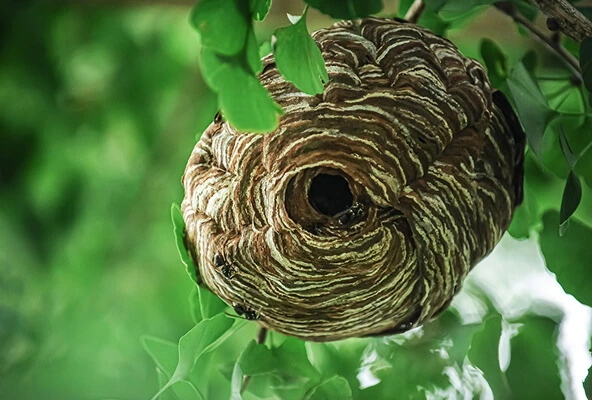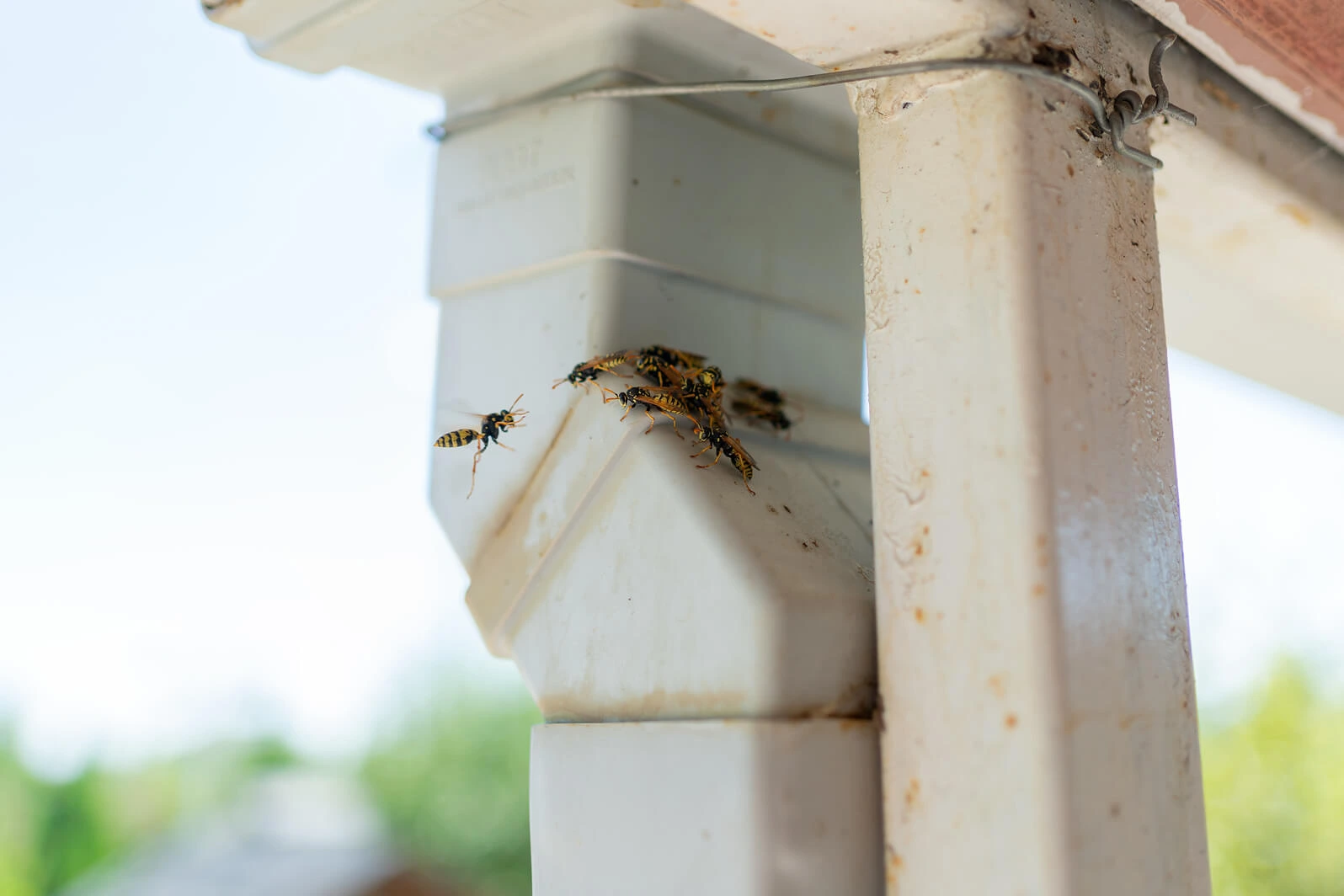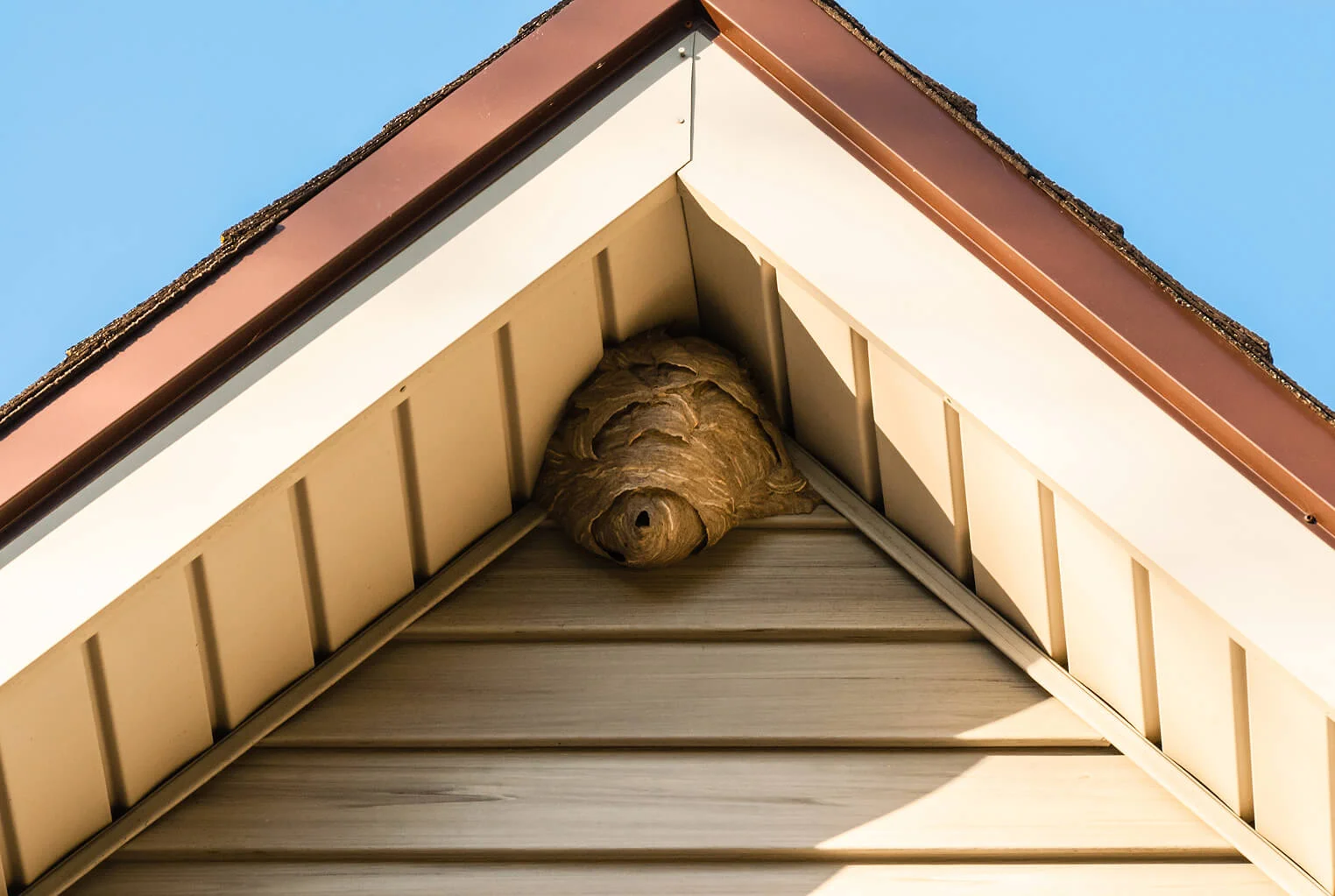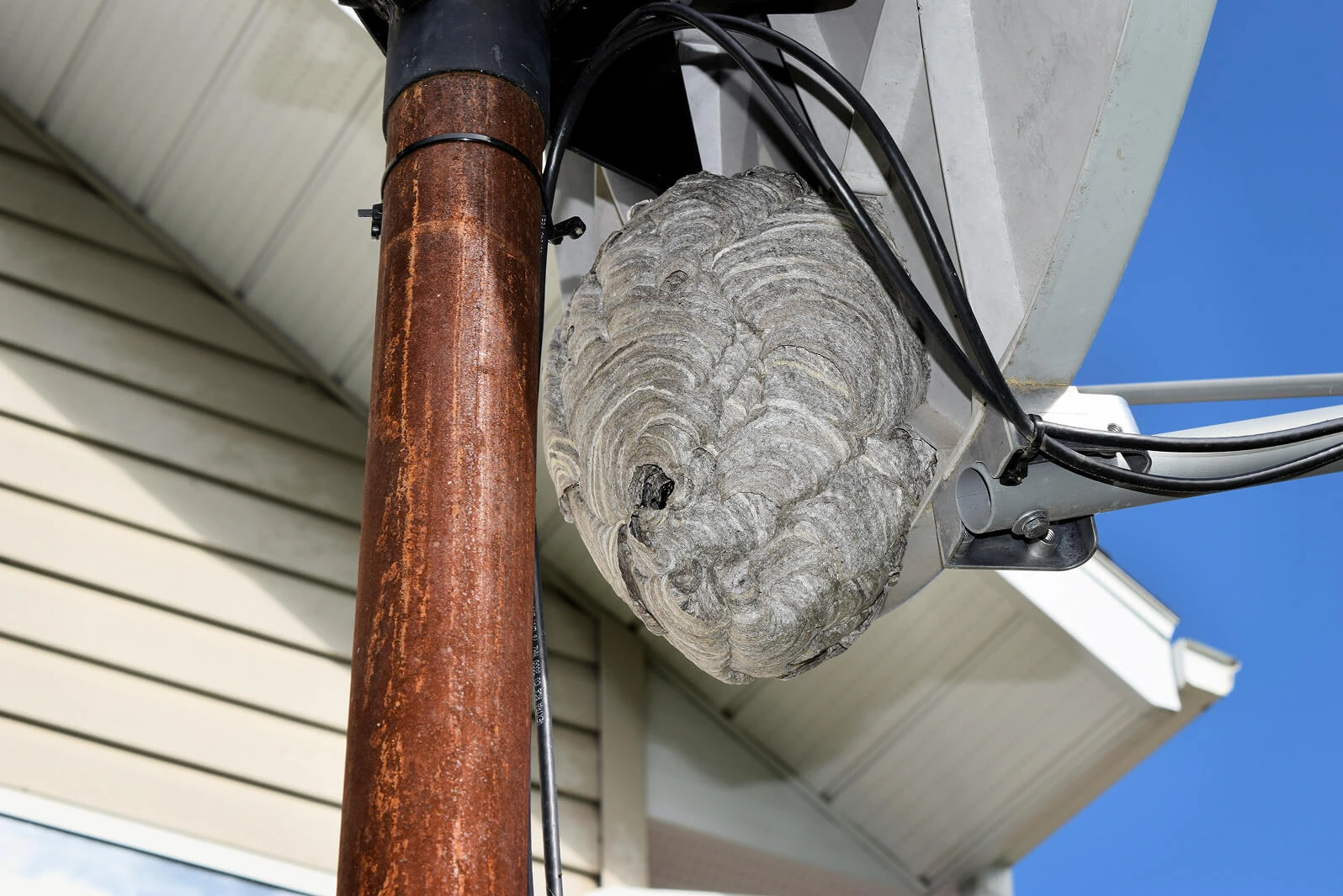Check out our current special offers to save on your next pest control service.
Bee and Wasp Control


Same-Day Treatment for Bees, Wasps, and Yellow Jackets
Don’t let stinging insects keep you from enjoying your outside living space. With Ransford Pest Control, if you are in our immediate service area and call before noon, we can come the same day to promptly and professionally treat your bee, wasp, or yellow jacket problems. Don’t wait until you or your loved ones get stung—call Ransford today!

Wasp and Bee Pest Removal: What You Need to Know
Though bees and wasps start foraging and exploring in March and April and are active throughout the summer, their activity peaks in August and September. While these insects are often part of the natural environment, they can pose serious risks to your family and pets, especially when their nests are disturbed.
Ransford Specializes in Safely Handling:
- Yellow Jackets
- White-faced Hornets
- European Hornets
- Paper Wasps
- Carpenter Bees
- Wasp Colonies
Our expert technicians are trained to get rid of bees and wasps to protect your home from these dangerous pests, ensuring peace of mind for you and the safety for your loved ones and pets. Let us help you enjoy your outdoor spaces without the worry of painful stings. If you are looking for consistent treatment, Ransford’s Premier Plan protects against mice, ants, and wasp colonies.
Same-Day
Services If You Call Before Noon
125+
Years in Business
Compassionate
Practices
Sustainable
Pest Control Methods
What Our Bee and Wasp Pest Control Services Include
At Ransford Pest Control, we have over 125 years of local experience providing safe and effective treatment against wasps, bees, and other species. Our experienced technicians are trained to handle infestations with precision, ensuring the complete elimination of nests while prioritizing the safety of your family and pets. Here’s how we make the wasp extermination process simple and hassle-free for you:
- Detailed Inspection: Our technician, equipped with a bee suit, will inspect the affected area to locate the nest(s). If necessary, the technician will use a thermal camera to detect nests hidden in wall voids.
- Targeted Applications: Once the nest is located, the technician will inject a dust with residual effects into the nest to eliminate all wasps. A liquid treatment may also be used to provide fast-acting results.
- Treating Hard to Reach Areas: To maintain the safety of our technicians, we do not send technicians up ladders. Our technicians use a 20-25 foot pole to treat nests that are high up.
- Free Retreatment: If live wasps are seen in the nest 3 days after treatment, we will return to re-treat at no additional charge until the problem is resolved.
- Ongoing Protection: If you’re enrolled in our Premier or Insect Plan, you can contact us for free, same-day treatment of any new common nests, as wasp colonies are covered on these plans.

Wasp Nest Treatment
At Ransford Pest Control, we provide effective wasp nest treatment. However, please note that we do not offer wasp nest removal.
Our technicians focus on eliminating the wasps by treating the nest, ensuring that the wasps die at the source. If the nest is removed without treatment, wasps that are outside the nest may return and rebuild a new one. After our treatment, if no activity is observed within 3 days, customers may choose to remove the nest if they wish, though nests usually deteriorate if left alone and unmaintained. We recommend not handling the nest alone until then to ensure complete elimination of the wasps.
Bee & Wasp FAQ
What’s the difference between a bumble bee and a carpenter bee?
Bumble bees and carpenter bees are often mistaken for each other. Bumble bees are typically found in ground nests or sheltered areas like flowering bushes, compost piles, or under decks. Carpenter bees can bore unsightly tunnels into wooden structures, such as decks, siding, fascia boards, and railings. This damage can weaken the wood over time and lead to costly property damage.
How can you visually see the difference between a bumble bee and a carpenter bee?
Carpenter bees have a distinct, shiny, hairless, and often black abdomen. They also tend to be significantly larger than bumble bees. Bumble bees are fuzzy all over their bodies, including their abdomens, which often display yellow banding. Both carpenter bees and bumble bees are typically social insects and rarely sting.
Why is professional bee and wasp treatment necessary?
Bees and wasps remain active well into the fall, and hives can quickly expand in size, posing increased risks to your family and pets. Attempting to handle a pest issue yourself can be dangerous, and a provoked nest can lead to aggressive behavior, putting you at risk of painful stings and potential allergic reactions. A professional exterminator has the expertise and proper equipment to safely and effectively treat the nest, ensuring complete eradication without further danger to you or your property. If you need a bee exterminator in Massachusetts, contact us. We’d be happy to help address your pest problem.
What are some of the most common stinging insects in Central Massachusetts?
While there are a variety of dangerous insects in the Central Massachusetts area, some of the most common include:
White-Faced Hornets: Also known as “bald-faced hornets” or “bull wasps,” white-faced hornets are large and black with white markings. White-faced hornets tend to have very large nests with a single queen and female sterile workers. They produce new queens and males late in the season. The queens will find a safe place for the winter, and a new nest starts the following spring. White-faced hornets are widely considered to be the most aggressive species of wasp in Massachusetts.
Yellow Jackets: Chances are, you’ve probably seen a yellow jacket at barbecues in the summer and fall. They have a thin, bright yellow and black appearance. Yellow jackets are so common at picnics that they have a nickname, “meat bees.” Make no mistake, though, yellow jackets are wasps. This species, amongst others, can latch on and sting multiple times. If you see a yellow jacket outdoors, do not swat at it. This action can potentially make the wasp more aggressive. Further, if you crush a wasp, it can release a chemical that draws other wasps to its location. This is a survival mechanism that signals wasps to investigate a threat. If you are looking for a yellow jacket exterminator near you, contact Ransford Pest Control.
European Hornets: European hornets look similar to yellow jackets, but have a red/brown tinge. They grow up to twice as large as regular yellow jackets, at 1.5 inches long. Despite their size, European hornets are typically only aggressive when defending their nests.
Paper Wasps: Paper wasps are typically slender wasps that form very distinct nests that are inverted and umbrella-shaped, with open cells at the bottom. An interesting feature about these nests is that you can literally see into their nest from underneath. They prefer covered, protected spots, like under eaves or decking.
Honey Bees: Honey bees are smaller and have slimmer bodies than their counterparts. They live in hives that can number in the tens of thousands. While there are some wild colonies out there, most hives are under the care of a beekeeper. Honey bees are not typically considered a nuisance, as they are not destructive and wild colonies are not usually found near homes. If you suspect you have a honey bee nest on your property, do not use any pesticide! It is best to contact a beekeeper and see if they can come and remove the bees for you.
Cicada Killers: Cicada killers are a large species of wasp, but these ones are not social. They each live individually in holes in the ground. You may see a large number of holes, commonly in sandy soil, or sometimes in retaining walls.
Mud Daubers: Mud Dauber is a name given to a variety of wasps that build their nests from mud. You may see their nests stuck on the side of a structure, under roof eaves, or in an attic. The nature of their nest means that it must be kept dry, so they usually construct their nests in a secluded place that can be difficult to access. Mud Daubers look like your typical wasp but tend to be black in color.
Let a Professional Wasp and Bee Exterminator Help
At Ransford Pest Control, we understand the urgency of dealing with active nests, which is why we offer quick, same-day service for wasp nest treatments. Whether it’s an emergency or a routine treatment, you can count on us to respond promptly and efficiently, ensuring peace of mind and protection from dangerous stings.
Trust Ransford to take care of your wasp and carpenter bee problems with professionalism and speed.
